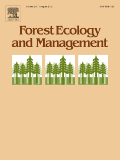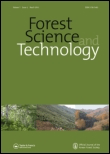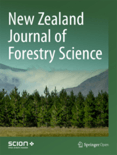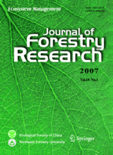
FOREST ECOLOGY AND MANAGEMENT
Scope & Guideline
Championing Interdisciplinary Collaboration in Forestry
Introduction
Aims and Scopes
- Forest Management and Sustainability:
The journal emphasizes research on sustainable forest management practices that balance ecological integrity with economic viability, aiming to maintain biodiversity and ecosystem services. - Ecological Dynamics and Biodiversity:
A core focus is on understanding the ecological dynamics within forest ecosystems, including species interactions, community structure, and the effects of management practices on biodiversity. - Climate Change Impacts:
Research addressing how climate change affects forest ecosystems, including tree growth, species distribution, and resilience to disturbances, is a significant area of interest. - Restoration Ecology:
The journal covers studies on forest restoration techniques and their effectiveness in rehabilitating degraded ecosystems, focusing on both native and non-native species. - Soil and Nutrient Dynamics:
Research on soil health, nutrient cycling, and the interactions between forest vegetation and soil microbial communities is emphasized to understand forest productivity and sustainability. - Wildlife Habitat and Conservation:
The journal explores the relationship between forest management practices and wildlife habitat quality, aiming to inform conservation strategies for both flora and fauna.
Trending and Emerging
- Climate Adaptation Strategies:
There is a growing body of research focused on developing and implementing climate adaptation strategies for forest management, reflecting the need to address the impacts of climate change. - Ecosystem Services and Functions:
A trend towards investigating the provision of ecosystem services, including carbon sequestration, water regulation, and habitat provision, is emerging as a significant focus in forest management research. - Technological Advances in Monitoring:
The use of advanced technologies such as remote sensing, LiDAR, and machine learning for forest monitoring and management is increasingly prevalent, enabling more precise and data-driven approaches. - Community Engagement and Social-Ecological Systems:
Research exploring the intersection of community engagement, indigenous knowledge, and forest management practices is gaining traction, highlighting the importance of integrating social perspectives into ecological research. - Biodiversity Conservation in Managed Forests:
Emerging studies are increasingly focused on maintaining and enhancing biodiversity within managed forest landscapes, recognizing the critical role of biodiversity in ecosystem resilience and function.
Declining or Waning
- Traditional Timber Production Focus:
There has been a noticeable decline in papers solely focused on traditional timber production methods, as the journal increasingly prioritizes sustainable practices that integrate ecological health with economic outcomes. - Monoculture Plantations:
Research specifically centered on monoculture plantation systems is waning, with a shift towards exploring mixed-species approaches that enhance biodiversity and ecosystem resilience. - Historical Forest Management Practices:
There is a decreasing emphasis on studies that solely analyze historical forest management practices without integrating contemporary ecological findings and adaptive management frameworks. - Invasive Species Management:
While still relevant, the focus on invasive species management as a standalone topic appears to be waning in favor of more integrative approaches that consider the role of invasives within broader ecosystem management contexts.
Similar Journals

Forest Science and Technology
Exploring the intersection of forestry and technology for a greener future.Forest Science and Technology is a premier open access journal published by Taylor & Francis Ltd, based in the United Kingdom. Established in 2005, this journal has become a key platform for disseminating high-quality research in the fields of Forestry and Environmental Science, maintaining a strong impact factor and impressive Scopus rankings. As of 2023, it proudly holds a Q2 quartile ranking in Forestry and a Q3 quartile ranking in Management, Policy, and Law categories, highlighting its significance in addressing contemporary challenges in forest management and conservation. With a dedication to fostering scholarly communication, the journal supports open access since 2017, making valuable findings accessible to a wider audience, including researchers, professionals, and students. With the coverage period extending to 2024, Forest Science and Technology continues to contribute to the discourse on sustainable forestry practices and innovative management strategies.

FOREST SCIENCE
Bridging theory and practice for sustainable forests.FOREST SCIENCE, published by Oxford University Press Inc, is a pivotal journal in the field of forestry and ecological modeling, boasting an impressive track record since its inception in 1970. With an ISSN of 0015-749X and E-ISSN 1938-3738, the journal provides a valuable platform for the dissemination of high-quality research and studies that address contemporary challenges in forestry and ecology. It ranks in the Q2 category for both ecology and forestry and holds a Q3 ranking in ecological modeling according to the latest evaluations, illustrating its significant contribution to these fields. The journal is accessible through various options, facilitating broad readership and engagement within the academic community. As part of its commitment to advancing knowledge and practices in forest management and conservation, FOREST SCIENCE seeks to bridge theoretical research with practical applications, making it an indispensable resource for researchers, professionals, and students alike.

ANNALS OF FOREST SCIENCE
Exploring the Depths of Forest EcosystemsANNALS OF FOREST SCIENCE, published by Springer France, stands at the forefront of ecological research, contributing significantly to both the fields of Ecology and Forestry, as evidenced by its prestigious Q1 ranking in both categories for 2023. Since its inception in 1999, this journal has become an essential resource for academics, practitioners, and students who are eager to explore the complexities of forest ecosystems and their interactions with global environmental changes. With an ISSN of 1286-4560 and E-ISSN 1297-966X, it disseminates cutting-edge research and critical reviews that enhance our understanding of forest science. Although it does not offer open access, the journal continues to be a pivotal platform for presenting innovative scientific findings that address the pressing challenges of forest management and conservation. Its significant impact factor reflects the high-quality contributions that have made a lasting mark on the discipline.

NEW ZEALAND JOURNAL OF FORESTRY SCIENCE
Nurturing Environmental Stewardship Through ResearchNEW ZEALAND JOURNAL OF FORESTRY SCIENCE (ISSN: 0048-0134; E-ISSN: 1179-5395), published by SCION, stands as a pivotal resource for researchers, professionals, and students dedicated to the fields of forestry, ecology, and plant sciences. With a strong commitment to open access since 2013, the journal promotes the dissemination of high-quality research and innovative practices within these disciplines, thereby fostering a greater understanding of the natural environment. The journal has achieved commendable rankings, being placed in the Q2 category in Ecology, Forestry, and Plant Science, reflecting its significant contribution to advancing knowledge and best practices in these areas. Based in Switzerland and published by SCION, a trusted name in forest research, the journal plays an integral role in shaping the dialogue around sustainable forest management and ecological conservation. As such, it serves as an essential platform for scholarly discourse and a valuable resource for anyone engaged in forestry and environmental studies.

EUROPEAN JOURNAL OF FOREST RESEARCH
Unveiling Insights for Climate-Resilient ForestsThe European Journal of Forest Research (ISSN: 1612-4669; E-ISSN: 1612-4677), published by Springer, stands at the forefront of advancing the field of forestry and plant sciences. With a distinguished reputation reflected in its Q1 category rankings in both Forestry and Plant Science for 2023, this journal excels in disseminating high-quality research that addresses the critical challenges facing forest ecosystems across Europe and beyond. Established in Germany, the journal has transitioned through various phases since its inception in 1996, striving to integrate innovative research findings that promote sustainable forest management and conservation strategies. As part of a rich academic tradition, it boasts a commendable ranking within the Scopus database, placing it in the top echelons of its category. Researchers and practitioners alike can benefit from its commitment to open access options, ensuring that cutting-edge studies are accessible to a global audience. The European Journal of Forest Research serves as an essential platform for knowledge exchange, aiming to enhance the understanding of forest dynamics and improve the management of forest resources in the face of a changing climate.

JOURNAL OF FORESTRY RESEARCH
Driving sustainable solutions through rigorous research.JOURNAL OF FORESTRY RESEARCH, published by Northeast Forestry University in China, stands as a pivotal platform for advancing the field of forestry science. With an ISSN of 1007-662X and an E-ISSN of 1993-0607, this esteemed journal has maintained its commitment to disseminating high-quality research since its inception in 1997, converging into a recognized authority through the years. Currently boasting a Q1 ranking in the Forestry category for 2023, it ranks 18th out of 174 journals in its field on Scopus, highlighting its vital role in shaping contemporary forestry studies. The journal focuses on a broad spectrum of topics pertinent to forestry, including sustainable forest management, ecology, and conservation efforts, making it an indispensable resource for researchers, professionals, and students alike. Although it is not an open-access publication, the insights shared within its pages promise to contribute significantly to the advancement of knowledge and practices in forestry. The journal's significant impact and relevance are underscored by its operations from Harbin, People's Republic of China, where it continues to foster scholarly communication in the world of forestry research.

Reports of Forestry Research-Zpravy Lesnickeho Vyzkumu
Pioneering research at the intersection of forestry and ecology.Reports of Forestry Research-Zpravy Lesnickeho Vyzkumu, published by the FORESTRY & GAME MANAGEMENT RESEARCH INST in the Czech Republic, serves as a vital forum for the exploration and dissemination of cutting-edge forestry research. With an ISSN of 0322-9688 and an E-ISSN of 1805-9872, this journal provides insights into various dimensions of forestry, nature conservation, and environmental sciences, contributing to both regional and global ecological discourses. Although currently categorized in the Q4 quartiles for Forestry and Nature and Landscape Conservation as of 2023, the journal aims to foster collaboration among researchers, professionals, and students devoted to sustainable forest management practices. The Scopus rankings reveal its position within the environmental science community, highlighting its role in addressing pressing ecological challenges. As the field continues to evolve, Reports of Forestry Research anticipates growth in accessibility and relevance, an essential resource for those committed to advancing forestry science and conservation efforts.

Trees Forests and People
Advancing Knowledge for Sustainable Forest ManagementTrees, Forests and People is an esteemed peer-reviewed journal published by Elsevier that commenced its journey in 2020 and focuses on the intricate relationships between trees, forests, and human communities. With its E-ISSN of 2666-7193, this journal serves as a vital platform for presenting cutting-edge research in disciplines such as forestry, environmental science, and management. Recognized for its impact within the academic community, it has achieved a prestigious Q1 ranking in both Economics, Econometrics and Finance (Miscellaneous) and Forestry, alongside a Q2 ranking in Management, Monitoring, Policy and Law as of 2023. Its Scopus rankings indicate robust positioning in various fields, appealing to a diverse audience of researchers, professionals, and policy-makers engaged in sustainable forest management and ecosystem services. By offering open access options, the journal ensures that critical findings are readily available to a global audience, fostering knowledge sharing and collaborative efforts aimed at addressing the pressing challenges in forest conservation and management.

Journal of Forest Science
Advancing forest knowledge for a sustainable future.Journal of Forest Science, published by the Czech Academy Agricultural Sciences, serves as a pivotal resource in the field of forestry and soil science. With its ISSN 1212-4834 and E-ISSN 1805-935X, this Open Access journal has been delivering insightful research since 2003, making knowledge freely available to researchers and practitioners globally. Hailing from the Czech Republic, the journal has established a notable impact within the academic community, as evidenced by its placements in the Q2 quartile for Forestry and Q3 for Soil Science according to the latest rankings. This positions the Journal of Forest Science favorably within academic discourse, ranking #73 out of 174 in Forestry and #84 out of 159 in Soil Science on Scopus, placing it at the 58th and 47th percentiles respectively. Covering a wide range of topics that intersect with environmental sustainability, forest management, and ecological research, the journal aims to foster innovation and collaboration within the scientific community. Researchers, professionals, and students can access published articles easily, bolstering the advancement of knowledge in forest science and its related disciplines.

FORESTRY
Advancing forestry knowledge for a sustainable future.FORESTRY is a prestigious journal dedicated to the advancing knowledge and innovative practices in the field of forestry, published by Oxford University Press. Established in 1927, it encompasses a rich history of scholarly contributions and has evolved to maintain its relevance, addressing contemporary issues and research in forestry and related disciplines. With an impressive Q1 ranking in the category of Forestry, this journal holds a notable position within the Scopus rankings, being placed 20th out of 174 in the Agricultural and Biological Sciences domain, highlighting its significant impact with an 88th percentile standing. Researchers, professionals, and students can access critical insights into forestry management, ecology, and policy, facilitating informed decision-making and fostering sustainable practices. While Open Access options are currently not available, the journal's rigorous peer-review process ensures the publication of high-quality research that contributes both to academic advancement and practical applications in forestry worldwide. The comprehensive coverage from 1927 to 2024 makes FORESTRY an invaluable resource for anyone invested in enhancing the field of forestry.